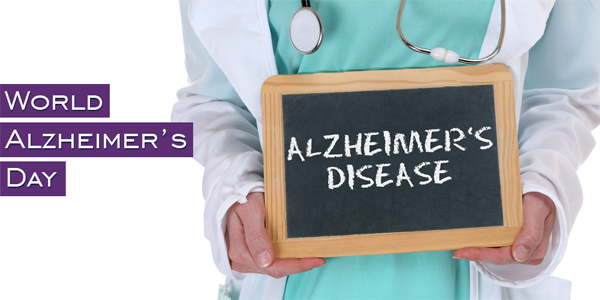We have all heard about the term Alzheimer’s. But do you know what happens in this disease? Let us understand more about Alzheimer’s disease this World Alzheimer’s day, 21st September 2016.
What is Alzheimer’s ?
Alzheimer’s disease is named after the doctor who first described it – Alois Alzheimer. It is a physical disease that affects the brain. During the course of the disease, proteins build up in the brain leading to loss of connections between nerve cells and eventually to the death of nerve cells. People with Alzheimer’s develop a shortage of some important chemicals in their brain, these chemicals help transmit signals around the brain.
Alzheimer’s disease is the most common cause of dementia. The word dementia describes a set of symptoms that can include memory loss and difficulties with thinking, problem-solving or language. Alzheimer’s is a progressive disease, which means over time, more parts of the brain are damaged and symptoms become more severe.
Who is at risk?
Most people develop Alzheimer’s disease after the age of 65. Above 65 years, a person’s risk of developing Alzheimer’s disease doubles approximately every five years. Research shows that almost twice as many women as men over 65 get Alzheimer’s. This disease may also be passed down by inheritance.
Health and lifestyle
Medical conditions such as diabetes, heart problems, high blood pressure, high cholesterol and obesity increase the risk of Alzheimer’s. People who adopt a healthy lifestyle, especially from mid-life onwards are less likely to develop Alzheimer’s disease.
Diagnosis
If you or a loved one is facing some of the below symptoms, then visit a doctor immediately. He may conduct initial checks or refer you to a specialist. Some brain scans show whether any changes have taken place in the brain.
Treatment
There is currently no cure for Alzheimer’s disease. Regular visit to a psychiatrist or a therapist works well for most patients. There are drug treatments for Alzheimer’s disease that can temporarily alleviate some symptoms or slow down their progression.
Symptoms
The most common symptom is loss of memory. However everyone is different and unique and face different symptoms.
Some of the most common symptoms are listed below
- Memory loss that disrupts daily life – One of the most common signs of Alzheimer’s is memory loss, especially forgetting recently learned information. Others include forgetting important dates or events and asking for the same information over and over.
- Challenges in planning or solving problems – Some people may experience changes in their ability to develop and follow a plan or work with numbers. They may have trouble following a familiar recipe or keeping track of monthly bills.
- Difficulty completing familiar tasks – People with Alzheimer’s often find it hard to complete daily tasks. It may include driving to a familiar location or remembering the rules of a favourite game.
- Confusion with place or time – People with Alzheimer’s can lose track of dates, seasons and the passage of time.
- Trouble understanding visual images and spatial relationships – For some people, having vision problems is a sign of Alzheimer’s. They may have difficulty reading, judging distance and determining colour or contrast.
- New problems with word in speaking or writing – People with Alzheimer’s may have trouble following or joining a conversation. They may also repeat themselves.
- Misplacing things and losing the ability to retrace steps – A person with Alzheimer’s disease may put things in unusual places. They may lose things and be unable to go back over their steps to find them again.
- Withdrawal from work or social activities – A person with Alzheimer’s may start to remove themselves from hobbies, social activities, work projects or sports.
The Alzheimer and Memory Clinic at Kokilaben Dhirubhai Ambani Hospital is a specialist clinic for people with neurological problems. We offer a comprehensive screening and care program for Alzheimer disease and other memory disorders, including neurology consultation, physical and cognitive rehabilitation, and psychotherapy.


